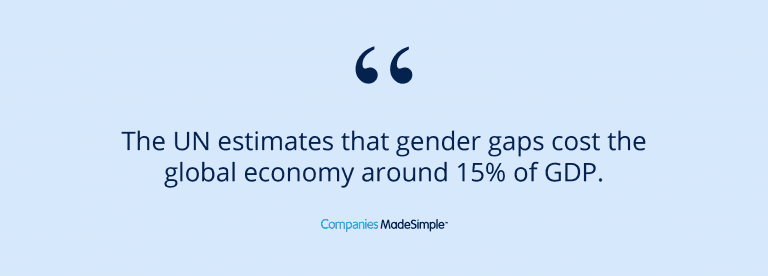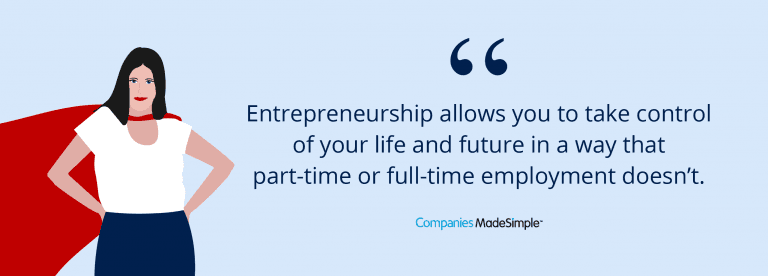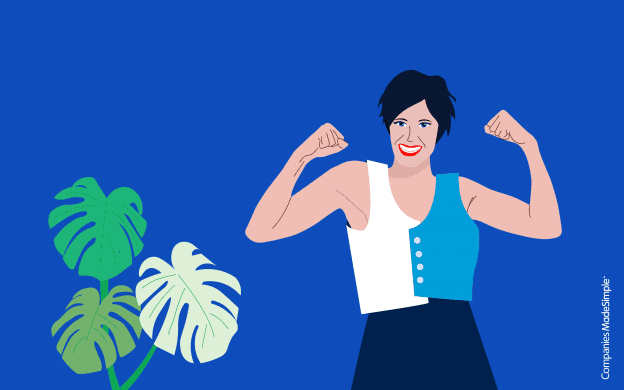Search ideas, news and case studies
Blog Categories
Women in Business Series: The Empowerment Gap

Welcome to our series: Women in Business. Over August, our four-part blog series will be delving into the current business environment and the state of female entrepreneurship. Examining the current landscape of female entrepreneurship and the challenges and setbacks faced by women who want to start their own ventures.
Our last blog provided an overview of the landscape for female entrepreneurs, and why we need more women-owned and led businesses. Over the next few blogs, we will be discussing three key challenges faced by women: lack of empowerment, funding and time.
This blog addresses the Empowerment Gap.
What is empowerment?
Empowerment is when someone, or a group, feels as if they have the power to control their lives and the ability to affect their futures. It is both an internal feeling of confidence and a feeling or power or control granted to you, or to a social group, externally through attitudes in society. For example, empowerment in the workplace may look like being heard, seen and respected. Therefore, an employee may feel empowered to make suggestions at work if they know they can approach their manager and be heard and met with an open-minded response. Thus the employee feels in charge of their fate, they feel as if they have the means (and power) to influence their working life.
There are multiple forms of empowerment from economic, personal, political, organisational, community, gender and more. Which can affect different groups and people, and differing social groups may feel empowered in one situation but not the other.
Everyone should feel as if they can control their circumstances, however, not everyone is able to due to biases in society or the circumstance they find themselves in. If you are an empowered person, you may never realise this fact. Being in control of your life and circumstances may seem inherent, but the reality is that in many cultures and societies, only a few social groups experience this in every situation.
The empowerment gap- women feel less empowered.
On the whole, women feel less empowered than men, whether this is in daily life, school or work. Empowerment and confidence can come from within but when the society favours one particular social group, they are empowered externally too. Women feel less empowered in themselves as they are less empowered in society. This is due to a couple of factors; socialisation, societal attitudes and obstacles.
Socialisation
Women are socialised differently from men, many are not encouraged to pursue skills which may improve their standing in a lot of business situations. For example, girls are more likely to be encouraged to be modest about their achievements and attributes. They are encouraged to ‘act sweetly’, keep the peace and ‘smile more’ all of which are attributes that seem in opposition with the ‘driven, aggressive, loud’ type of masculine entrepreneurship we see. Not to mention that young girls are often not encouraged to be financially literate or business minded, or most of the education in these topics are formulated for men’s understanding.
Essentially from a young age, a woman’s socialisation can push her away from places of control and power. So when approaching a huge change such as entrepreneurship, women feel disempowered. This isn’t to say that individual men do not feel moments of unsureness or lack of confidence, but men, as a group, do not face these barriers as often. They have role models, they’re encouraged to be confident, loud and proud about their achievements and work all of which are thought to be ‘entrepreneurial traits’ and complement early-stage entrepreneurial activity.
Societal attitudes
Women also feel disempowered due to attitudes in society. In June 2023 the UN reported that 9 out of 10 people are still biased against women. Many people, including women, believe that women are better suited for secondary roles which empower and support men. Women still face discrimination based on gender in this way, women are assumed to be too emotional to run ventures. Often, female entrepreneurs are taken less seriously, for example, less than 1% of UK Venture funding is awarded to all female teams. Despite research proving that businesses founded by women ultimately deliver higher revenue, they are generally regarded as high-risk. It is difficult to determine why people have these negative attitudes towards female-owned and led businesses however, they do exist and they do have real effects on the empowerment of female entrepreneurs and the success of their business.
Lack of visibility and role models
Finally, there are a few obstacles which make female entrepreneurship harder. First, there is a lack of visibility surrounding existing female entrepreneurs. Santander conducted a study which proved that 81% of young people can’t name one female entrepreneur, and this has a lasting effect on future entrepreneurs. Imagination is a huge part of innovation, and if women can not name or imagine a female success story this can be a blow to empowerment.
Coupled with the lack of visibility comes a lack of accessible role models, women may not know where to go to find role models, a network or mentorship- or if any even exist. If women have a lack of role models they may become discouraged or as if society doesn’t want to see female entrepreneurship.
Why we need to close the empowerment gap
The UN estimates that gender gaps cost the global economy around 15% of GDP. In short, when women do not participate in the labour market due to a lack of empowerment, it literally costs. Empowerment boosts, diversifies and stimulates the economy, as the Rose Review reports, an additional £250 billion can be added to the UK economy if women created businesses at the same rate as men. Women-owned and led businesses are shown to increase organisational effectiveness and growth.

How can we close the gap?
What would it take to achieve this empowerment? It can be argued that first the mounting damage done by having an unequal society must be undone. Women need to be able to express themselves safely, and they need to believe in themselves and have access to tools which allows them to build empowerment. Women need to be confident that they can respond and take down new threats, that they can approach new opportunities without doubt and fear and that they can boldly innovate. Ultimately, the power and confidence men feel (as a social group) women should feel too. As it stands, women feel held back due to these barriers and feel as if they are watching men continuously climb and overcome that wall.
This is, of course, easier said than done. Empowerment can look like a lot of things to a lot of people and there are different forms of empowerment. A study by PWC showed that women have a few ranging examples of what empowerment looks like in the workplace. Women cited anything from better control over working hours, finding their jobs fulfilling, and being listened to by their manager as ways they can increase empowerment. But if we tackle empowerment as a way to literally empower women- make them feel in control of their fate- then there are certain approaches: education, networking and mentorship and self-empowerment.
Empowerment through education
“Then, when you know better, do better” – Maya Angelou
Education is one way to gain empowerment, whether that is to fill a knowledge gap or to grow personal confidence through education. Research from ‘Closing the gender gap in Entrepreneurship’ argues that there is some evidence that female entrepreneurs have less skill variety compared to their male counterparts. This is due to the fact that men have certain social advantages such as; higher level work experience, a chance to focus their work and personal interests widely to acclimate a ‘jack-of-all-trades’ skill set, and men regarding social networking as a situation to see what they may gain whereas women place a focus on what they can give or are responsible for. The paper argues that due to this men have higher ambitions and focus for early-stage entrepreneurship.
Therefore, a way to lessen this gap, and to drive women’s ambition for entrepreneurship is to focus on building skills through education. By approaching education as a way to build a wider skill set, female entrepreneurs may want to focus on learning topics outside of their comfort zone and industries. For example, a drama course may allow an entrepreneur to grow skills around pitching, talking in front of a crowd, and project management all of which can be applied to daily business practice.
However, it is important to also address practical skills needed as an entrepreneur such as budgeting, business plan writing and bookkeeping. Financial literacy is key to empowerment as being aware of how finances work is its own form of control. Many people feel anxious about money, in fact, in the UK almost half of the population struggles with financial literacy. As an entrepreneur, an understanding of finance is key to understanding the health of your business.
Accredited learning: degrees, adult learning classes and short courses
One way to build such skills is through accredited courses. These courses are often run by colleges or universities and provide you with a certification after completion. Most commonly, these are known as higher education courses which cover anything from short courses to a full university degree. There are many classes which are offered in higher education courses surrounding entrepreneurship. From marketing to business planning to even budgeting and finance. Even if entrepreneurs choose to take a non-business class, there are many transferable skills to be gained in education, as mentioned above. Most courses take a varied form of coursework which expands a person’s skills. From presenting topics to a tutor and classmates to conducting extensive research for coursework or simply finding yourself socialising and network-building with classmates and lecturers.
Most UK councils offer generally subsidised adult learning courses aimed at 19+ adults who want to broaden their skills or learn something new. Some of these classes or courses are free (for people with extenuating circumstances i.e. no existing university degree, low income or unemployed). This is a great option for budding entrepreneurs who have a solid idea of a business but may not have technical skills and knowledge when it comes to running a business. It is also suited for those who may have taken a long hiatus from work due to becoming a parent or other caring responsibilities. Most of these adult learning courses can be found on your local council’s website.
Non-accredited education: online resources
Education can of course take many forms, not everyone wants to and has the means to attend higher education programmes. There are many ways to receive an education or learn about topics outside of formal education. Thanks to the internet there are a number of ways to learn about topics and skills through mediums such as videos, podcasts, blogs, and online courses run by industry professionals. For example, our blog contains information from the next steps after making a business plan to how to apply for grants and this is just one of the millions of blogs existing online. A benefit of using the internet to educate and build skills is that anyone can access it on their own time. For example, a podcast can be listened to whilst commuting to work, a youtube video can be watched whilst doing housework, and a blog can be read before bed or in the morning. However, it is important to consider that not everything online is true or helpful, using online resources can be great to update knowledge about certain things, but in some cases, an accredited course may be more helpful. It is essential to practise awareness with all the information found online.
Education builds confidence within everyone, and confidence helps build empowerment. An entrepreneur may feel more in charge of their fate if they feel more educated about their industry or business skills.
Network and Mentorships
Female entrepreneurs may require more support and encouragement at the onset but without accessible role models, this can be disempowering. One way to overcome this is by finding a network of like-minded entrepreneurs. Not only does having a network make entrepreneurs feel less alone, but it can be beneficial to businesses too. A network can provide an entrepreneur with new suppliers, new clients, helpful advice, and more opportunities to expand their network. It is always useful to have a group of people to fall back on when you need to discuss issues or setbacks. PWC reports that 58% of working women say that being listened to is important to their empowerment at work, suggesting that being heard about issues, good news etc is empowering. There are many available networking groups, particularly those which cater to female entrepreneurs. Prowess, an organisation which provides business resources for female entrepreneurs, keeps an updated list of networking groups around the UK. Along with many other useful resources which can help build empowerment.
Finding a mentor is a similar way to build empowerment, having an experienced professional to advise and guide you can build confidence in newer entrepreneurs. Once again, this can allow entrepreneurs to feel heard and gives them an outlet to discuss worries or success. Mentors can also help create business plans, find funding routes and lend support to a business’s visibility. A mentor can be anyone from a professional in your industry to another entrepreneur. The Rose Review highlights a few useful places to seek out mentorship such as AllBright but many organisations offer networking and membership opportunities such as the Financial Times’ Women in Business, and #SheMeansBusiness. British Business Bank has a list of prominent support groups aimed at elevating female entrepreneurs. Entrepreneurs may consider reaching out to inspiring women from networking events and work etc and asking them for mentorship. Mentorship can make a huge difference to an entrepreneur’s business and empowerment but many consider being a mentor as empowering too. After all, exchanging ideas with ‘newer’ entrepreneurs can be revitalising and have a positive effect on more seasoned professionals.
Self-empowerment
Empowerment can be determined by external and internal factors. Feeling empowered within can result in acting more empowered in daily life. Therefore, self-empowerment is one way to gain confidence as an entrepreneur. There are many ways to increase self-confidence: from reading books to listening to wellness podcasts, to meditation and support from family and friends. Many business leaders talk about feigning confidence and ignoring that feeling of imposter syndrome. There are no prerequisites for a degree or gender or anything else when it comes to being an entrepreneur, all that is required is a good idea and drive to succeed.

Entrepreneurship is empowering
Entrepreneurship allows you to take control of your life and future in a way that part-time or full-time employment doesn’t. Being an entrepreneur means getting to decide how to work, where to work, and what to work on (industry and projects). Entrepreneurs get to determine their time commitment and pay and they often find their work fulfilling and motivating. This is empowerment. In their ‘Global Workforce Hopes and Fears Survey’ PWC reports that most women workers feel empowered when they have control over their own time when they can choose where to work (in person, hybrid, remote) when they can choose how to work, and they find their work fulfilling. Entrepreneurs, as shown, tend to have much more control over these factors.
Therefore, paradoxically, it can be incredibly empowering to be an entrepreneur. Suggesting that rising to the challenge of entrepreneurship and swallowing doubts of confidence can be the exact antidote to a lack of empowerment.
Over this month, our four-part series will cover these three main setbacks and look at ways to approach and address them. The next blog will focus on funding, and exploring how banks and financial institutions can be alienating to female entrepreneurs and alternative ways to seek funding.







